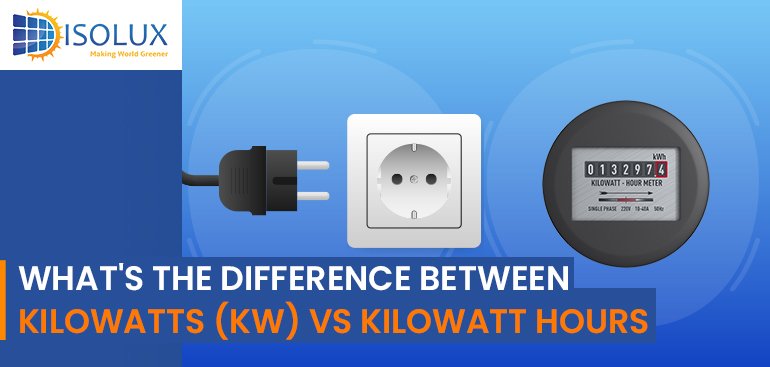Understanding the difference between kilowatts (kW) and kilowatt-hours (kWh) is essential for anyone interested in energy consumption, solar power systems, and electricity bills. While both terms are commonly used in discussions about power and energy, they represent different concepts. In this article, we’ll explore the definitions, applications, and differences between kW and kWh, and how this knowledge can help you manage your energy usage more effectively.
What is a Kilowatt (kW)?
A kilowatt (kW) is a unit of power. Power, in the context of electricity, is the rate at which energy is used or produced. One kilowatt is equivalent to 1,000 watts. This measurement tells us how much energy an appliance or system uses or generates at any given moment.
Key Points about Kilowatts:
- Measurement of Power: kW measures the rate of energy consumption or generation.
- Instantaneous Value: Represents the power at a specific instant.
- Common Usage: Used to rate electrical appliances, solar panels, and generators.
For example, if you have a 2 kW solar panel system, it can produce 2 kilowatts of power under optimal conditions. Similarly, a 1.5 kW heater uses 1.5 kilowatts of power when it is running.
If you’re looking to purchase a New Solar Panel in Sydney, Isolux Solar can be your premier choice! Call 1300 552 452 to get a free quote.
What is a Kilowatt-hour (kWh)?
A kilowatt-hour (kWh) is a unit of energy. It represents the amount of energy used or produced over time. One kilowatt-hour is equivalent to using 1,000 watts of power for one hour. This measurement is commonly used by utility companies to calculate electricity consumption and billing.
Key Points about Kilowatt-hours:
- Measurement of Energy: kWh measures the total energy consumed or generated over a period.
- Cumulative Value: Represents the accumulated power usage over time.
- Common Usage: Used to track energy consumption on electricity bills and measure the output of solar power systems.
For example, if you use a 1 kW appliance for one hour, you have consumed 1 kWh of energy. If you use the same appliance for two hours, you have consumed 2 kWh of energy.
Differences Between Kilowatts and Kilowatt-hours
Understanding the distinction between kilowatts and kilowatt-hours is crucial for managing energy consumption and costs. Here are the main differences:
Nature of Measurement:
Kilowatts (kW): Measure the rate of energy usage or production at a specific moment.
Kilowatt-hours (kWh): Measure the total amount of energy used or produced over time.
Application:
Kilowatts (kW): Used to rate the capacity of electrical devices and power systems.
Kilowatt-hours (kWh): Used to measure energy consumption for billing purposes and to track energy production.
Usage in Solar Power:
Kilowatts (kW): Used to specify the size of solar power systems (e.g., a 5 kW solar panel system).
Kilowatt-hours (kWh): Used to measure the total energy generated by the solar system over time (e.g., the system produced 20 kWh today).
Practical Examples
To further illustrate the differences between kW and kWh, let’s consider some practical examples:
Home Appliances:
Power Rating (kW): A typical microwave oven might have a power rating of 1 kW.
Energy Consumption (kWh): If you use the microwave for 30 minutes, you consume 0.5 kWh of energy (1 kW x 0.5 hours).
Solar Power System:
System Size (kW): A residential solar panel system might be rated at 6 kW.
Energy Production (kWh): If the system operates at full capacity for 4 hours, it produces 24 kWh of energy (6 kW x 4 hours).
Electricity Bill:
Power Usage (kW): The peak power demand of your household might be 10 kW.
Energy Usage (kWh): Over a billing period, your household might consume 500 kWh of energy.
Importance of Understanding kW and kWh
Energy Management:
Understanding kW and kWh helps you manage your energy consumption more effectively. By knowing the power ratings of your appliances (kW) and monitoring your total energy usage (kWh), you can identify areas to reduce consumption and save on electricity bills.
Solar System Planning:
When planning a solar power system, knowing the difference between kW and kWh is essential. The system’s kW rating tells you its capacity, while the kWh measurement indicates how much energy it can produce over time. This information helps in sizing the system to meet your energy needs.
Cost Savings:
By understanding kW and kWh, you can make informed decisions about energy usage, such as shifting high-energy activities to off-peak times or investing in energy-efficient appliances, leading to significant cost savings.
Conclusion
Understanding the difference between kilowatts (kW) and kilowatt-hours (kWh) is fundamental for effective energy management, whether you are monitoring your electricity usage, planning a solar power system, or trying to reduce your energy bills. Kilowatts measure the rate of power usage or production at a specific moment, while kilowatt-hours measure the total energy consumed or generated over time. By grasping these concepts, you can make more informed decisions about your energy consumption and achieve greater efficiency and cost savings. For more information and professional advice on energy management and solar power systems, visit Isolux Solar’s website and explore our range of services and products tailored to meet your energy needs.
Also read:




